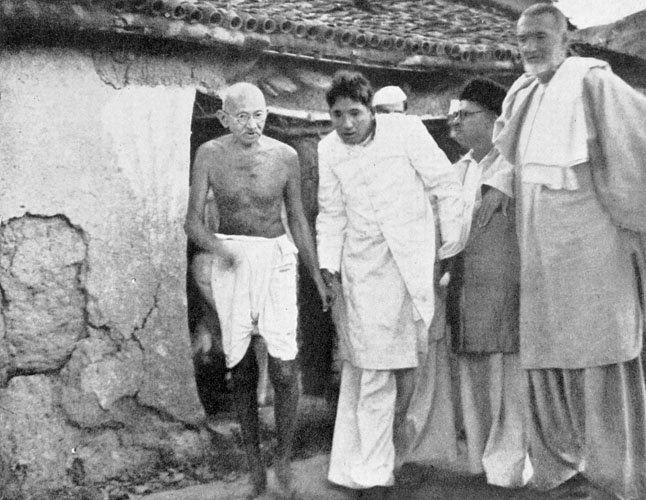

Gandhi’s Silence on India’s First Independence DayMahatma Gandhi was a sad, worried man when India got Independence, due to this reason.
|
- By Vinod Janardhanan*
In the riot affected area of Bela, Bihar, March 28, 1947 Mahatma Gandhi, who led India's freedom struggle, was a deeply anguished man when the nation gained Independence from Britain on 15 August 1947. He had no time for celebrations, as the father of the nation was working hard to quell the Hindu-Muslim violence and riots that broke out along with the Partition of the subcontinent. Here is a look into what he did and said during those fateful days of 14-15 August 1947. What was Gandhi doing on 14 August 1947?As Pandit Jawaharlal Nehru, who went on to become India's first prime minister, announced India's 'tryst with destiny' in the intervening night of 14 and 15th August, 1947, Gandhi chose not to join the Independence Day celebrations in Delhi. On 14 August 1947, Gandhi was staying at Hydari Manzil, a house in the Muslim-dominated Beliaghata area of Calcutta (now Kolkata) in east India, amid communities most affected by the riots. That day, he met local leaders, including the Muslim League's Huseyn Shaheed Suhrawardy, the former premier of Bengal. In an appeal for peace, Gandhi undertook a 24-hour fast. He addressed a prayer meeting in the evening, and urged people to maintain peace and brotherhood. He expressed hope that Calcutta could set an example of communal harmony for the rest of India. What was Gandhi doing on 15 August 1947?As Indians celebrated Independence Day, Gandhi continued to be in Calcutta. He spent the day visiting riot-hit areas, meeting victims and holding more prayer meetings. His presence contributed to Calcutta becoming relatively calm on 15th August. In the prayer meetings, there were readings from the Quran, the Bhagwat Gita, and the Bible to symbolise interfaith unity. What did Gandhi say during the days of India's Independence?Gandhi's statements from these days are both hopeful and full of sorrow. As recorded in The Collected Works of Mahatma Gandhi, he said at a prayer meeting on 14 August 1947: “I am not going to Delhi to participate in the festivities of August 15. My place is here with you, in the midst of this suffering. If Calcutta can remain peaceful, it will be a miracle and a lesson for the whole of India.” He shared his thinking in a message to the nation on 15 August: “This is a day of rejoicing, but for me, it is also a day of sorrow. Freedom has come, but it is stained with blood. We must pledge to wipe out this stain with our love and unity.” The same day, in a letter to a friend, Gandhi wrote: “I am not able to rejoice as others do. My heart is with those who are suffering in this hour of freedom.” In the book Mahatma Gandhi: The Last Phase, his secretary Pyarelal wrote that Gandhi was heartbroken over the partition and the ensuing violence, feeling that his lifelong mission of Hindu-Muslim unity had been undermined. Gandhi said, according to Pyarelal: “I have no desire to live if India is to be engulfed in this bloodshed.” In letters and speeches from the time, Gandhi said his "heart is heavy", as freedom "has come at a terrible price.” As an advocate of non-violence, Gandhi saw the riots and violence as a personal failure. wionews.com, dated 12.08.2025 Vinod Janardhanan, PhD writes on international affairs, defence, Indian news, entertainment and technology and business with special focus on artificial intelligence. He is the deputy editor of WION Digital. |